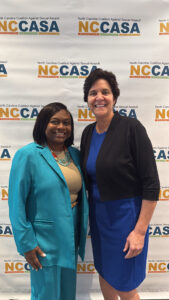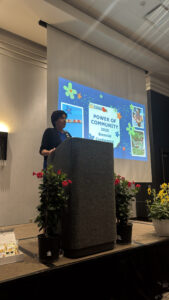Honoring Latinx Hispanic Heritage Month
October 2, 2025
Honoring Latinx Hispanic Heritage Month: Celebrating Leaders in the Movement to End Sexual Violence
Each year from September 15th through October 15th, Latinx Hispanic Heritage Month is celebrated to uplift the histories, cultures, and contributions of Hispanic and Latinx communities. For us at NCCASA, this is also a time to reflect on the powerful leadership of Hispanic and Latinx advocates in our communities who are dedicated to advancing the movement to end sexual violence.
The challenge to create a world free of sexual violence is deeply intertwined with efforts for equity, cultural recognition and acceptance, and justice. Hispanic and Latinx advocates, educators, and community organizers have been at the forefront of this work, ensuring that prevention and healing efforts include the voices and experiences of their communities.
A Lifelong Advocate for Survivors: Rosie Hidalgo
This past May, NCCASA had the honor of hosting Rosie Hidalgo, a lifelong advocate and the former Director of the Office of Violence Against Women, at our Biennial Conference: The Power of Community.
Rosie Hidalgo has long been at the forefront of policy and advocacy efforts that center survivors’ needs—particularly survivors from marginalized and immigrant communities. Her work has been instrumental in ensuring access to trauma-informed, culturally responsive services for Latinx survivors of sexual violence and domestic violence.
As the daughter of immigrants, Rosie spent a total of 10 years as an adult living in three different countries in Latin America, including the Dominican Republic, where she helped establish and coordinate a community-based domestic violence prevention and intervention network and worked as a consultant for the World Bank on social services reforms.
Through her leadership in organizations such as Casa de Esperanza (now Esperanza United) and her time as a national policy advocate, Rosie has consistently fought for systemic reforms that uplift survivors’ voices. She has also played a key role in expanding funding and resources for community-based programs, recognizing that healing and prevention must be rooted in culture and community.
In more recent years from 2023 until January 2025, Rosie Hidalgo was appointed to serve as the Director of the Office on Violence Against Women (OVW) at the U.S. Department of Justice, where she continued to champion survivor-centered policies at the federal level. Her leadership reflects a deep commitment to ensuring that survivors—regardless of their immigration status, language, or background—can access the safety and support they deserve.
Currently Rosie is a Visiting Research Scholar in the Human Rights Program of the University of Miami School of Law. She also is a consultant serving as a Senior Advisor at the Battered Women’s Justice Project with the Re-Imagining CCR Initiative.
 Monika and Rosie at NCCASA’s Biennial Conference
Monika and Rosie at NCCASA’s Biennial Conference
 Rosie speaking at our Biennial Conference: Power of Community
Rosie speaking at our Biennial Conference: Power of Community
The Power of Community-Centered Advocacy
Rosie is one of many powerful Latinx advocates working towards a world free of sexual violence. Across North Carolina and beyond, Hispanic and Latinx advocates are leading prevention programs, offering bilingual support services, and creating community-based responses that recognize the strengths and resilience of survivors. Additionally, their work significantly helps dismantle language and cultural barriers that too often prevent survivors from accessing support.
Final Considerations
As we celebrate Latinx Hispanic Heritage Month, we honor the advocates, survivors, and leaders who continue to push the movement to end violence forward. Their contributions remind us that the fight to end sexual violence must always be intersectional—recognizing how culture, language, power, and identity shape the experiences of survivors.
This month and every month, NCCASA commits to supporting Hispanic and Latinx leaders, listening to survivors, and ensuring that prevention and healing efforts reflect the richness and diversity of all communities in North Carolina.

